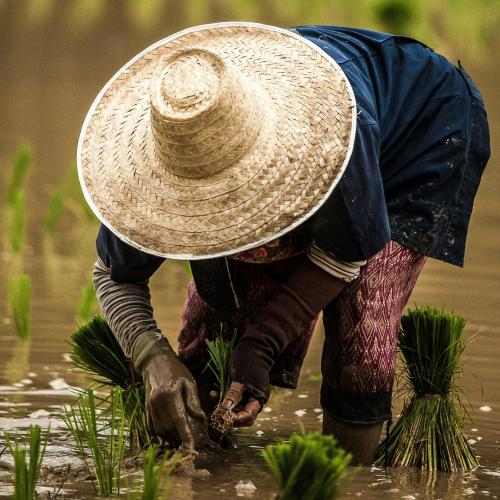ASEAN green recovery through equity and empowerment
Context
Southeast Asia’s agriculture sector has immense potential to reduce rural poverty, tackle gender inequities and meet the climate challenge. Smallholders are the backbone of Southeast Asian agriculture, with around 55 million households among the hardest hit by the Covid-19 pandemic due to difficulty selling produce, finding employment/labour amidst work stoppages, paying loans and investing for next season’s crops.
Women comprise around 32% of agricultural labour in Southeast Asia’s agricultural-exporting countries, in communities with 50% higher poverty rates than cities. Women are often engaged only as labourers, seldom own land for collateral, are less educated/literate, and face burdens such as providing care for out-of-school children or sick household members. As men migrate to cities for work, women are increasingly the head of households and are vulnerable to climate and economic shocks with limited time and finances.
Globally, 23% of greenhouse gas emissions come from agriculture, forestry and land use, yet land also acts as a tremendous carbon sink. With 200 million+ hectares of forest cover, Southeast Asia is home to nearly 15% of the world’s tropical forests but is also a major deforestation hotspot, mostly due to the conversion of intact forests into plantations. Rice, one of the most important crops for millions of farmers, is traditionally grown in flooded fields resulting in emissions of methane - 34x more potent than carbon dioxide.
The Association of Southeast Asian Nations (ASEAN) member states have made commitments, particularly through Nationally Determined Contributions (NDCs). Yet as ESCAP, UNEP and Greenwerk’s (2020) assessment of progress towards NDC implementation in the region finds, many states are in the early stages of estimating financial needs for climate action and allocating budgets for this in sectoral ministries. Most states are yet to establish the means of engaging and driving the private sector to act.
These priorities have been acknowledged by ASEAN Heads of State, which adopted the ASEAN’s Covid-19 Comprehensive Recovery Framework and its Implementation Plan as a consolidated exit strategy from the Covid-19 crisis, while laying the foundations of a more inclusive, resilient and sustainable future. In particular, the Implementation Plan’s Broad Strategy 5 - Advancing towards a More Sustainable and Resilient Future - underscores ASEAN’s commitment to a pro-poor, inclusive, gender-, culture- and climate-responsive policymaking.
Objectives
This project aims to inform a transition to a low-carbon economy in ASEAN’s agriculture sector, specifically in the countries of Cambodia, Vietnam and the Philippines.
The project objective is to promote livelihoods and green job opportunities for women in support of ASEAN’s Covid-19 Comprehensive Recovery Framework. Specifically, the project will research and pilot value chain actions by private and public actors that raise women’s knowledge and capacity to adopt climate-positive practices, and demonstrate women’s roles as a critical to economic recovery and sustained prosperity.
ASEAN member state policy responses need to consider women’s roles in agri-food systems and ensure that their multiple needs – as guardians of household food security, food producers, farm managers, processors, traders, wage workers and entrepreneurs – are adequately addressed.
The research will uncover not just symptoms (lack of education, skills or training), but also systemic root causes (sociocultural norms, legal/policy-based discrimination) of gender inequality and investigate new barriers to women’s economic empowerment as a result of the Covid-19 pandemic.
Partners
This project is implemented through the Grow Asia network, which comprises the regional team and three of Grow Asia’s six Country Partnerships—the Cambodia Partnership for Sustainable Agriculture (CPSA), the Philippines Partnership for Sustainable Agriculture (PPSA) and the Partnership for Sustainable Agriculture in Vietnam (PSAV).
Each Country Partnership will be working with locally-based Research Partners not only to increase local institutional effectiveness but also to develop locally-informed approaches aligned with country contexts.
Activities
This project will impact a wide range of agriculture value-chain actors and demonstrate how the ASEAN Comprehensive Recovery Framework Implementation Plan can be gender and climate responsive. The project will conduct private-sector engaged research in Cambodia, Vietnam and Philippines, to understand opportunities and barriers to economic opportunities and pandemic-recovery strategies that are both gender-inclusive and climate-positive.
A diverse range of stakeholders will be involved in the AGREE project. The project specifically targets engagement with agribusinesses and social enterprises, which have the potential to positively impact millions of women in the three countries. The project will inform private enterprises on how to mainstream gender and enhance inclusion while contributing to national climate objectives.
Through the pilot exercises in partnership with private actors, women farmers and cooperatives will gain knowledge and skills on enterprise growth, market access, conservation and climate-smart practices.
The project will also target policymakers who seek to scale up their gender mainstreaming policies as well as climate-smart agriculture practices to achieve their NDC targets for the agriculture and land-use sectors. Through the project inputs, policymakers will understand the ‘how’ of transitioning to inclusive and low-carbon economies, including through incentives and public procurement, financing schemes and policies that align with NDCs.
Contact
Sarin Tey
Program Manager, Cambodia Partnership for Sustainable Agriculture
sarin@cpsa-growasia.org
Amy Chua
Country Director, Philippines Partnership for Sustainable Agriculture
amy@ppsa-ph.org
Reginald Lee
Head of Knowledge and Programs, Grow Asia
reginald@growasia.org


